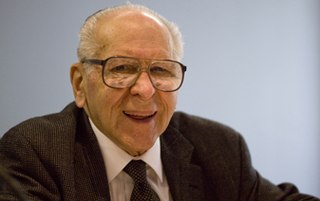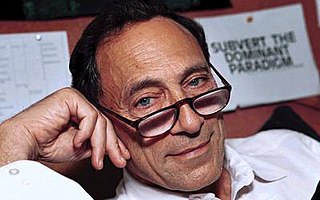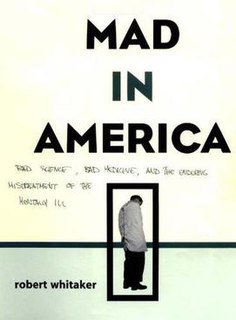A mental disorder, also called a mental illness or psychiatric disorder, is a behavioral or mental pattern that causes significant distress or impairment of personal functioning. Such features may be persistent, relapsing and remitting, or occur as single episodes. Many disorders have been described, with signs and symptoms that vary widely between specific disorders. Such disorders may be diagnosed by a mental health professional, usually a clinical psychologist or psychiatrist.

Anti-psychiatry is a movement based on the view that psychiatric treatment is often more damaging than helpful to patients, highlighting controversies about psychiatry. Objections may include concerns about the effectiveness and potential harm of treatments such as electroconvulsive treatment or insulin shock therapy.

Thomas Stephen Szasz was a Hungarian-American academic and psychiatrist. He served for most of his career as professor of psychiatry at the State University of New York Upstate Medical University in Syracuse, New York. A distinguished lifetime fellow of the American Psychiatric Association and a life member of the American Psychoanalytic Association, he was best known as a social critic of the moral and scientific foundations of psychiatry, as what he saw as the social control aims of medicine in modern society, as well as scientism. His books The Myth of Mental Illness (1961) and The Manufacture of Madness (1970) set out some of the arguments most associated with him.

John Edward Mack was an American psychiatrist, writer, and professor and the head of the department of psychiatry at Harvard Medical School. In 1977, Mack won the Pulitzer Prize for his book A Prince of Our Disorder on T.E. Lawrence.

The Pulitzer Prize for Explanatory Reporting has been presented since 1998, for a distinguished example of explanatory reporting that illuminates a significant and complex subject, demonstrating mastery of the subject, lucid writing and clear presentation. From 1985 to 1997, it was known as the Pulitzer Prize for Explanatory Journalism.
Cognitive neuropsychiatry is a growing multidisciplinary field arising out of cognitive psychology and neuropsychiatry that aims to understand mental illness and psychopathology in terms of models of normal psychological function. A concern with the neural substrates of impaired cognitive mechanisms links cognitive neuropsychiatry to the basic neuroscience. Alternatively, CNP provides a way of uncovering normal psychological processes by studying the effects of their change or impairment.

Since the founding of the Church of Scientology in 1954 by L. Ron Hubbard, the relationship between Scientology and psychiatry has been dominated by strong opposition by the organization against the medical specialty of psychiatry, and of psychology, with themes relating to this opposition occurring repeatedly throughout Scientology literature and doctrine. According to the Church of Scientology, psychiatry has a long history of improper and abusive care. The group's views have been disputed, criticized and condemned by experts in the medical and scientific community and been a source of public controversy.

Adolf Meyer was a Swiss-born psychiatrist who rose to prominence as the first psychiatrist-in-chief of the Johns Hopkins Hospital (1910-1941). He was president of the American Psychiatric Association in 1927–28 and was one of the most influential figures in psychiatry in the first half of the twentieth century. His focus on collecting detailed case histories on patients was one of the most prominent of his contributions. He oversaw the building and development of the Henry Phipps Psychiatric Clinic at Johns Hopkins Hospital, opened in April 1913, making sure it was suitable for scientific research, training and treatment. Meyer's work at the Phipps Clinic is possibly the most significant aspect of his career.

Mad in America: Bad Science, Bad Medicine, and the Enduring Mistreatment of the Mentally Ill is a 2002 book by medical journalist Robert Whitaker, in which the author examines and questions the efficacy, safety, and ethics of past and present psychiatric interventions for severe mental illnesses, particularly antipsychotics. The book is organized as a historical timeline of treatment development in the United States.

Robert Whitaker is an American journalist and author, writing primarily about medicine, science, and history. He is the author of five books, three of which cover the history or practice of modern psychiatry. He has won numerous awards for science writing, and in 1998 he was part of a team writing for the Boston Globe that was shortlisted for the 1999 Pulitzer Prize for Public Service for a series of articles questioning the ethics of psychiatric research in which unsuspecting patients were given drugs expected to heighten their psychosis. He is the founder and publisher of Mad in America, a webzine critical of the modern psychiatric establishment.
Nancy Coover Andreasen is an American neuroscientist and neuropsychiatrist. She currently holds the Andrew H. Woods Chair of Psychiatry at the Roy J. and Lucille A. Carver College of Medicine at the University of Iowa.
The biopsychiatry controversy is a dispute over which viewpoint should predominate and form a basis of psychiatric theory and practice. The debate is a criticism of a claimed strict biological view of psychiatric thinking. Its critics include disparate groups such as the antipsychiatry movement and some academics.

The following are the Pulitzer Prizes for 1985.
The following are the Pulitzer Prizes for 1979.
Psychiatry is the medical specialty devoted to the diagnosis, prevention, and treatment of mental disorders. These include various maladaptations related to mood, behaviour, cognition, and perceptions. See glossary of psychiatry.
Paul Rodney McHugh is an American psychiatrist, researcher, and educator. He is currently the University Distinguished Service Professor of Psychiatry at the Johns Hopkins University School of Medicine and the author, co-author, or editor of seven books in his field. McHugh is a vocal proponent of Catholic-informed and socially conservative stances relating to sexual orientation and transgender people. Some scientists accuse McHugh of misrepresenting scientific research relating to sexual orientation.
Jon Daniel Franklin is an American writer. He was born in Enid, Oklahoma. He won the inaugural Pulitzer Prizes in two journalism categories both for his work as a science writer with the Baltimore Evening Sun. Franklin holds a B.S. in journalism from the University of Maryland. He is currently professor emeritus of journalism at his alma mater; previously, Franklin taught creative writing at the University of Oregon and was the head of the technical journalism department at Oregon State University. He received honorary degrees from the University of Maryland in 1981 and Notre Dame de Namur University in 1982.
Edward Adam Strecker, M.D. (1886–1959) was an American physician, a psychiatric educator, a professor of psychiatry at several medical schools, and a leader in American psychiatry during the mid-twentieth century.
The philosophy of psychiatry explores philosophical questions relating to psychiatry and mental illness. The philosopher of science and medicine Dominic Murphy identifies three areas of exploration in the philosophy of psychiatry. The first concerns the examination of psychiatry as a science, using the tools of the philosophy of science more broadly. The second entails the examination of the concepts employed in discussion of mental illness, including the experience of mental illness, and the normative questions it raises. The third area concerns the links and discontinuities between the philosophy of mind and psychopathology.
Anne Harrington is an American science historian and the Franklin L. Ford Professor of the History of Science at Harvard University. Her primary research area is the history of psychiatry, neuroscience, and cognitive science.








